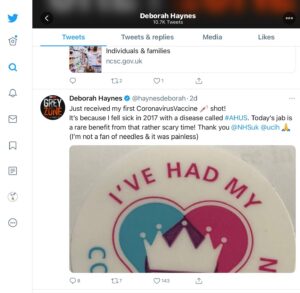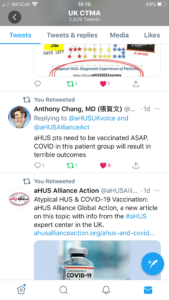Article No. 414
28 January 2021
A further update on the issue of aHUS and COVID 19 vaccinations from the author’s experience.
The author had the Oxford-AstraZeneca COVID 19 vaccine in January . The first of two and reported “Now after more than 24 hours the most noticeable effect is the vaccine arm aches a bit but it is a sign that something is happening. Though a broken night’s sleep and a waking headache could be attributed. Nothing too different from other vaccinations so far. 36 hours on the aches seem to have gone but a wearyness pervades, not feeling like doing much. Temperature normal. 48 hours after. Better night’s sleep but vaccine arm now feels sore at the point of inoculation. Not had COVID 19 infection, would reaction be worse if I had? 72 hours after, nothing now noticeable. As I understand it with the vaccine there is eventually just a 10% chance of having symptomatic COVID 19 should I become infected. Now 7 days post vaccination so another week to 2 weeks to go before an acquired immunity is achieved”.
“Almost 12 weeks post first vaccination the author has had a second Astra-Zeneca COCID 19 vaccine dose. Just 24 hours on from the jab and no noticeable after effects like last time. Very mindful of the clinical opinions of political leaders which are putting off people to get vaccinated. They are very worried about a rare clotting condition that might be triggered in some ,possibly 4 in a million. 10 times less rare than aHUS! Vaccination aHUS is considerably rarer than aHUS. 72 hours after vaccination and there has been almost hardly noticeable arm ache at the jab site. So just 11 days before full effectiveness results.”
“Nothing further happened. Now 6 months after the second vaccination the author received a third vaccination , a “booster” because some immunity drops over time. This time it was the Pfizer jab, mixing types of vaccine has been found by researchers to have benefits. The seasonal “flu jab” was given at the same time, one in each arm. In the first 24 hours some pain was only felt in the COVID vaccination arm. One more day and a better night’s sleep even that had subsided. So that has been the personal experience of the vaccine and its immediate after effects. Another two weeks for personal immunity to rise to the highest level and in time for winter flu and COVID season will throw at us.”
One day we all may experience a COVID-19 infection the hope is with some immunity it will not be as serious as it has been for some before vaccines became available. There has been very little reported by patients and COVID vaccinations for those with and susceptible to aHUS. So perhaps it was not the issue that most thought it would be, except perhaps for aHUS patients on dialysis or with transplants.
Other advice has been received.
Firstly Dr Brad Dixon has provided an opinion about vaccination for those who have experienced aHUS but who are now in untreated remission.
“I think it would be fine to add my thoughts about vaccine still being safer than what COVID could be, especially in the setting of untreated aHUS and dysregulated complement activation. On the one hand, possible complement activation by a COVID vaccine could in theory lead to activation of aHUS and relapse in someone whose disease is quiescent, but they are off Soliris or Ultomiris. On the other hand, that individual could have a similar (or worse) complement activation by a COVID infection, leading to more severe COVID illness (as complement seems to be a mediator of the severe lung injury in COVID), a relapse of the aHUS off of Soliris/Ultomiris, or both. I think that in weighing the risks of aHUS relapse from COVID vaccine vs. aHUS relapse from COVID itself, I would probably counsel towards receiving the vaccine. At least with receiving the vaccine, one can monitor carefully after vaccination for a relapse, vs. monitoring for relapse in the setting of the unpredictability of COVID infection.
Secondly aHUS patient Deborah who is in just that circumstance recently tweeted that she has had her first “coronavirusvaccine shot” to encourage others.

My aHUS Global Action article about information on COVID19 vaccination for those affected by aHUS created a bit of a stir! The response to it was wide ranging and very positive.
The first reaction came soon after a tweet about the article. A clinician known to the aHUS Global Action ( see article 380 about his talk on aHUS diagnosis ) made an emphatic statement in reply.

“aHUS pts need to be vaccinated ASAP, COVID in this patient group results in terrible outcomes” His view was supported by eight other renal specialists.
Some comments from an American pediatric aHUS specialist Dr Brad Dixon were reported on another aHUS patients platform.
“From my understanding of the Pfizer and Moderna vaccines, they are not live vaccines, in that they are only mRNA (message RNA) that sends a message to the body to make the coronavirus spike protein, for the immune system to recognize it as a threat and develop an immune response. The message does not instruct the production of any of the other parts of the virus, though, so even someone with a weakened immune system cannot get sick (get the virus) from the vaccine. There are other vaccines in development that are live virus vaccines, using an adenovirus vector (delivery vehicle) to deliver the vaccine and generate an immune response, and someone with a weakened immune system probably should not have this.
That said, in patients on complement-blocking therapies like eculizumab and ravulizumab, it is not my practice to avoid live virus vaccines like MMR and varicella (chicken pox/shingles). Patients on immunosuppressive medications after a solid organ transplant like prednisone, tacrolimus, and mycophenolate (CellCept) have a suppressed cellular immunity (T cells and B cells), and it is those patients where they may not be able to fight off a weakened live virus vaccine like MMR or varicella, but complement does not play a major role in protecting us from viruses like it does in protecting us from bacteria or fungi. I would feel safe allowing my patients with aHUS who are on eculizumab and ravulizumab to have the Pfizer and Moderna vaccines.”
aHUS Global Action Articld 392 about mRNA vaccines explained why such vaccines are safer than using traditional vaccine technologies.
An aHUS patient from The Netherlands aHUS Group reported on her experience of having a COVID 19 vaccination;
Each country has its own vaccine roll out programme. Usually priority is given to key workers e.g. healthcare staff and the elderly over 80 in care homes and in the community. Then to those vulnerable in descending order of age to 65 , and, at some point, including those younger who are clinically vulnerable. Including those with aHUS. Though not necessarily those susceptible to aHUS but not yet onset.
But eventually it will move on to the general population, but not those under 18 yet.
When the time comes the decision to be vaccinated will be the individual’s. What they decide will be down to the balance of risks.

